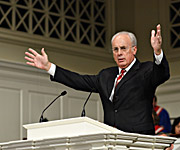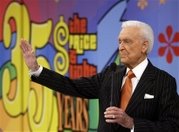I thought this would be worth posting for a couple of reasons, I don't believe either of these movements match-up with a God Centered Christ exalting approach to evangelism or worship. Both of these movements are geared to be as seeker sensitive as possible, filling churches with unsaved "Christians" - they believe Calvinism is ruining the church. I believe the seeker sensitive movement is killing the church, by making people believe they are saved when they aren't, for just signing a card and checking a box. And then they tell them to never doubt your decision or let anyone tell you any different. Paul said "we are to examine ourselves to see that we are in the faith". These false "Christians" then join churches and it is like oil and water, they don't desire to grow and they have to be re-evangelized every weekend. It is a recipe for trouble that I have run into more than once. I think it is ironic that the two cannot get along and have divorced themselves from each other. As a point of clarity I do not agree with either of these churches methodologies in just about anything that they do.
Calvary Chapel and Purpose Driven
by Roger Oakland
Since Rick Warren’s best selling Purpose Driven book and other related products were pulled from Calvary Distribution, [1] a number of people have contacted me asking for an explanation. My answer has been quite simple - contact someone at Calvary Distribution and ask them for the answer.
While I do speak at many different Calvary Chapels throughout the USA and around the world, I am not involved in the decisions that the leaders of Calvary Chapel make. Basically, I am a missionary to the world, based in southern California, affiliated with the Calvary Chapel movement. The ministry of Understand The Times is a discernment ministry, and I am dedicated to warning people about current trends within Christianity which lead believers and non believers away from the truth of God’s Word. Other than warning people, there is not much else I can do.
My Background
I consider Pastor Chuck Smith to be my own pastor, and I attend Calvary Costa Mesa when I am in southern California. I have been familiar with the Calvary Chapel movement since June of 1981 when I was first invited as a guest speaker at Calvary Chapel of Costa Mesa. Since 1988 the ministry of Understand The Times has been affiliated with Calvary Chapel movement and I have spoken at hundreds of churches and conferences by invitation of Calvary Chapel pastors worldwide
Therefore, my 25 years of experience within the Calvary Chapel movement has provided the opportunity for me to be able to make observations about the Calvary Chapel movement. While this movement is made up of individuals who have various ideas (some are even supportive of Purpose Driven), the leader, Pastor Chuck Smith has made it clear on several occasions that he does not agree with the direction the Purpose Driven movement is headed.
Over the past year or so, it should have been obvious to anyone listening to messages by Pastor Chuck Smith, Sr. that he has expressed serious concerns about the Purpose Driven church growth movement. On numerous occasions he made the point that the Calvary way, was not the Purpose Driven way. He made it clear that healthy church growth should be centered on the teaching of the Word of God and not on methods derived by human effort. From the beginning of the Calvary Chapel movement, Chuck has emphasized being “spirit led” rather than being motivated by a humanistic agenda put in place by church growth experts.
Further, pastors who attended the nation-wide Calvary Chapel Pastor’s Conferences held at Murrieta, California in either 2005 or 2006 would have heard Pastor Chuck explain in detail that Calvary Chapel pastors are not to be “Purpose Driven”. While there were some in attendance who were leaning towards Purpose Driven methods, Pastor Chuck emphasized Calvary Chapel was not going in that direction.
Distribution of “Purpose Driven” at Calvary Distribution
Based on what I have just stated, it was surprising to me that Calvary Distribution ever distributed Rick Warren’s “Purpose Driven” books and associated products in the first place. The fact that a decision was made to remove these materials from Calvary Distribution seemed logical based on my knowledge of what Calvary Chapel stands for and what Rick Warren’s “Purpose Driven” church growth philosophy represents.
As I stated in the introduction of this commentary, although I have no authority to make comments on behalf of Chuck Smith, Calvary Chapel Costa Mesa, or Calvary Distribution, I am willing to go on record and make comments regarding my perspective on why I believe Calvary Distribution pulled the Rick Warren materials. Following are four of my reasons:
1. Eschatology
The Calvary Chapel view of the future compared to the “Purpose Driven” view of the future is as different as day and night. One of the distinctives of the Calvary movement is a focus on the imminent return of Jesus Christ. Pastor Chuck has always been known for an emphasis on warning Christians to be alert and ready for the return of Jesus. He teaches that the Kingdom of God will be established only when Jesus Christ returns to this planet. He also emphasizes that the time period before the return of Jesus here on earth will be “as it was in the days of Noah.” [2] From this perspective, the world actually gets worse and worse, not better and better.
Rick Warren’s view of the present and the future is different from Chuck Smith’s. Warren encourages his followers to ignore Bible prophecy and spend their time and energy on the here and now, in order to establish a man made social plan (P.E.A.C.E. Plan) that will make planet earth a better place for everyone. With regards to the importance of Bible prophecy, Rick Warren has stated:
When the disciples wanted to talk about prophecy, Jesus quickly switched the conversation to evangelism. He wanted them to concentrate on their mission to the world. He said in essence, "The details of my return are none of your business. What is your business is the mission I have given you. Focus on that!"
Speculating on the exact timing of Christ's return is futile, because Jesus said, "No one knows about that day or hour, not even the angels in heaven, nor the Son, but only the Father." Since Jesus said he didn't know the day or hour, why should you try to figure it out" What we do know for sure is this: Jesus will not return until everyone God wants to hear the Good News has heard it. Jesus said, "The Good News about God's kingdom will be preached in all the world, to every nation. Then the end will come." If you want Jesus to come back sooner, focus on fulfilling your mission, not figuring out prophecy. [3]
Further, Rick Warren’s Purpose Driven P.E.A.C.E. Plan is part of a plan that is intended to establish the Kingdom of God here on earth before Jesus returns. This Kingdom depends on human effort. He is willing to work with governments (Rwanda [4]), political leaders (King of Jordan [5]), the United Nations (Inter-religious gatherings [6]) and even the Roman Catholic Church [7].
For full article click here.














